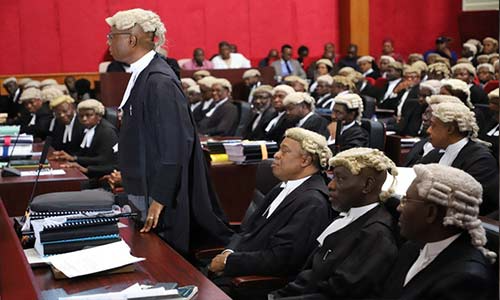As the National Assembly moves to review the 1999 Constitution of the Federal Republic of Nigeria (as amended), a Senior Advocate of Nigeria (SAN), Mohammed Ndarani Mohammed, has advocated for the empowerment of traditional rulers to address the nation’s security challenges and accountability in governance.
Ndarani said traditional rulers play a crucial role in combating security challenges across Nigeria while canvassing for the removal of immunity clause for state governors to ensure greater accountability and transparency in governance.
In a proposal, he emphasised the need to amend Section 21(a) & (b) of the 1999 Constitution to explicitly recognise the role of traditional rulers in addressing security challenges.
“Traditional rulers, as custodians of cultural heritage and moral values, are deeply embedded in their communities and possess unique insights into local dynamics. By leveraging their influence and authority, they can contribute significantly to efforts aimed at curbing insecurity nationwide,” he said.
Furthermore, Ndarani (SAN) drew attention to Article 17, Subsections 2 & 3 of the African Charter on Human and Peoples’ Rights, which affirm the role of traditional rulers in promoting and protecting cultural life and values. Recognised and respected across various communities, traditional rulers are ideally positioned to collaborate with governmental bodies and security agencies in addressing security threats in their domains.
Highlighting the importance of traditional rulers as mediators and arbitrators, Ndarani, SAN pointed out that they serve as indispensable agents in resolving conflicts within their communities.
“Their involvement in dispute resolution mechanisms not only fosters peace but also strengthens social cohesion and stability,” he added.
In addition to advocating for the empowerment of traditional rulers, the Senior Advocate proposed the removal of immunity clause for state governors as enshrined in Section 308 of the 1999 Constitution.
“This amendment would enable criminal proceedings to be instituted against governors and their deputies during their tenure, thus holding them accountable for any misconduct, corruption, or negligence in governance.
“By eliminating immunity provisions, Ndarani maintained that governors would be more inclined to uphold their responsibilities with integrity and diligence, knowing that they are subject to legal scrutiny and accountability measures.
“This, in turn, would contribute to a culture of transparency, efficiency, and ethical leadership within Nigeria’s political landscape,” he stated.
In addition, he said advocacy for constitution reforms underscores the importance of harnessing the collective wisdom and authority of traditional rulers in addressing security challenges and promoting good governance.
“By empowering traditional institutions and ensuring accountability at all levels of government, Nigeria can navigate its way towards a safer, more prosperous future,” he added.




